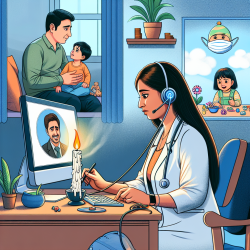Introduction
As a speech-language pathologist dedicated to creating positive outcomes for children, it is crucial to incorporate data-driven decisions and culturally relevant research into practice. A recent study titled Addressing Cancer Health Disparities in the Pacific Peoples of Hawai‘i, Guam, and the US Associated Pacific Islands Through Pacific-Focused Research Capacity Building provides valuable insights that can enhance our understanding and approaches when working with Indigenous Pacific Peoples (IPPs).
Understanding Cancer Health Disparities in IPPs
The research highlights significant cancer health disparities (CHDs) among IPPs in Guam, Hawai‘i, and the US Associated Pacific Islands (USAPI). These disparities are attributed to sociocultural, geographic, and biological factors, leading to late-stage diagnoses and poor survival outcomes. For speech-language pathologists, understanding these disparities is essential in providing culturally competent care and supporting effective communication strategies.
Key Outcomes and Implications for Practitioners
The study underscores the importance of Pacific-focused research capacity building, which has led to significant advancements in health equity through cancer research, training, and outreach. Here are some key outcomes and implications for practitioners:
- Community Engagement: The participatory development process has been instrumental in passing cancer prevention and control legislation. Speech-language pathologists can collaborate with community advisory groups to tailor interventions that address specific communication needs related to cancer education and awareness.
- Research and Training Opportunities: The partnership between the University of Guam and the University of Hawai‘i Cancer Center has trained numerous graduate scholars from under-represented minorities. Practitioners should consider engaging in similar research and training opportunities to enhance their skills and contribute to the field.
- Focus on Culturally Relevant Research: The study emphasizes the need for research that addresses regional and cultural relevance. Speech-language pathologists can advocate for and participate in research that considers the unique linguistic and cultural contexts of IPPs.
Encouraging Further Research and Practice Integration
For speech-language pathologists, integrating findings from this research into practice can improve communication outcomes for IPPs. Here are some steps to consider:
- Stay Informed: Regularly review current research related to cancer health disparities and Indigenous populations. This knowledge can inform your practice and help you advocate for evidence-based interventions.
- Collaborate with Multidisciplinary Teams: Work with healthcare providers, researchers, and community leaders to develop comprehensive care plans that address the communication needs of patients with cancer.
- Participate in Training Programs: Seek out training opportunities that focus on cultural competence and health disparities. These programs can provide valuable insights and skills to enhance your practice.
Conclusion
By leveraging the outcomes of Pacific-focused research, speech-language pathologists can play a pivotal role in addressing cancer health disparities among Indigenous Pacific Peoples. Embracing culturally relevant research and integrating it into practice will not only improve communication outcomes but also contribute to advancing health equity in these communities.
To read the original research paper, please follow this link: Addressing Cancer Health Disparities in the Pacific Peoples of Hawai‘i, Guam, and the US Associated Pacific Islands Through Pacific-Focused Research Capacity Building.










